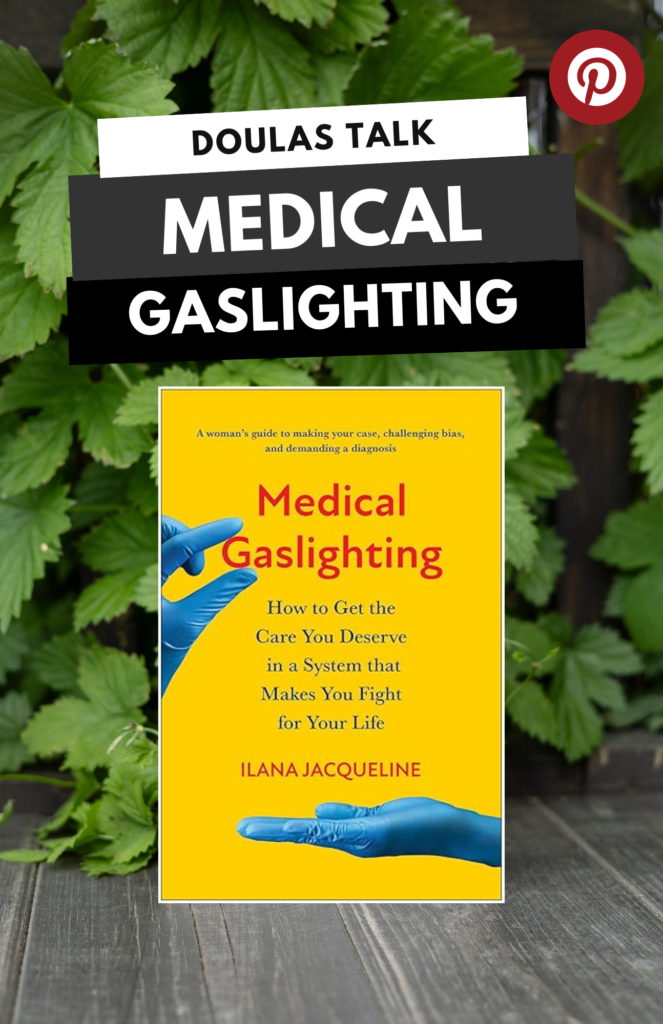
As doulas and birth professionals, we witness the full spectrum of experiences that pregnant and birthing individuals face when interacting with the healthcare system. While many encounters are respectful and supportive, too often, we also see instances of medical gaslighting—where clients’ concerns are dismissed, downplayed, or outright ignored. This can lead to negative health outcomes, heightened anxiety, and a deep sense of mistrust in the medical community.
In Ilana Jacqueline’s book Medical Gaslighting, she uncovers the ways in which medical professionals can unintentionally (or sometimes intentionally) contribute to this harmful dynamic, leaving patients feeling powerless and unheard. As birth workers, it’s critical to understand these dynamics and recognize how we can provide crucial support and advocacy in these situations.
What Medical Gaslighting Looks Like in Maternity Care
Medical gaslighting takes many forms, but some of the most common examples doulas see in birth work include:
- Dismissal of Pain: Clients often report that their pain is downplayed or disregarded, with phrases like, “It’s just normal pregnancy discomfort” or “You’re overreacting.” For individuals with underlying conditions or previous trauma, this can be deeply distressing.
- Disregarding Intuition: Pregnant people frequently know when something feels “off” with their bodies or their babies. When these instincts are brushed aside by medical professionals, it can lead to delays in necessary care.
- Pressure for Interventions: While interventions can be life-saving, many clients feel pressured into procedures like inductions or cesareans without adequate information or the opportunity to ask questions. When these concerns are dismissed as “unnecessary worries,” clients lose trust in their care providers.
- Racial and Socioeconomic Disparities: We know from overwhelming research that Black and Brown birthing people, as well as those from lower socioeconomic backgrounds, are disproportionately subjected to disrespectful and dismissive care. The medical gaslighting they face is compounded by systemic biases, which leads to higher rates of maternal mortality and morbidity.
The Impact of Disrespectful Care
Disrespectful or dismissive care doesn’t just harm a client’s immediate experience—it can have long-lasting effects, including:
- Emotional Trauma: When a client feels unheard or belittled during a vulnerable moment, it can result in trauma that impacts future medical experiences and mental health.
- Mistrust in Healthcare: After being dismissed or gaslit by medical professionals, clients may become reluctant to seek care in the future, fearing further mistreatment.
- Poor Health Outcomes: The most serious consequence of medical gaslighting is the potential for poor health outcomes. When a client’s concerns are not taken seriously, they may face unnecessary complications or worsening conditions.
How Doulas Can Help Combat Medical Gaslighting
As doulas, we play a unique role in standing alongside our clients and ensuring their voices are heard. While we can’t make medical decisions for them, we can:
- Validate Concerns: One of the simplest but most powerful things we can do is validate a client’s experience. By listening to their concerns and affirming their instincts, we help build their confidence and empower them to advocate for themselves.
- Bridge the Communication Gap: Sometimes, medical professionals use language that is dismissive or confusing. Doulas can help translate that information, ensuring that clients understand what’s happening and feel equipped to ask questions or voice their concerns.
- Support Informed Consent: It’s crucial that clients understand their options, risks, and benefits before any medical interventions. We can encourage clients to ask for more time or more information if they feel pressured into a decision.
- Advocate for Respectful Care: When we witness medical gaslighting or disrespectful care, we can respectfully advocate for our clients by asking clarifying questions or encouraging a second opinion. Sometimes, just having a calm, informed advocate in the room makes all the difference.
Changing the Narrative in Maternity Care
Addressing medical gaslighting starts with awareness—and that’s why books like Medical Gaslighting by Ilana Jacqueline are so important. By bringing these issues to light, we can work together as birth professionals to create a more respectful, inclusive healthcare environment. When we listen to our clients, support them in advocating for themselves, and push for changes in the system, we help lay the foundation for safer, more empowering births.
If you’re a doula or birth worker, I invite you to join our upcoming book club where we’ll be discussing Medical Gaslighting in detail. Let’s learn together how we can better support our clients and push for the respectful, compassionate care they deserve.






